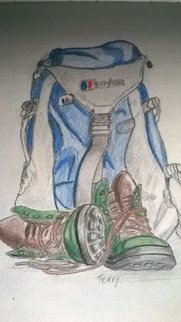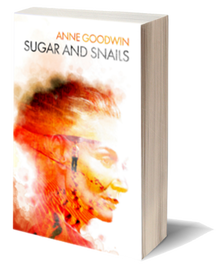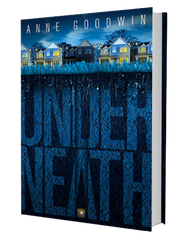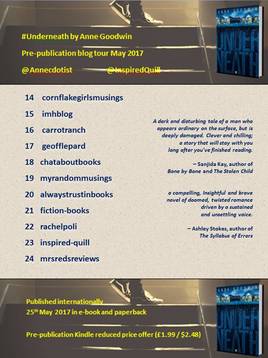| One of the themes of my second novel, Underneath, is the complex relationship between homecoming and travel, a topic explored in my recent guest post, The passion for travel and the concept of home. Although, as reflected in a recent post on my two accidental visits to Bangladesh, I’m nostalgic for my youthful travelling, these days I much prefer to stay at home and do my travelling in my head. |
| The theme of going away and coming home again resonates strongly in my reading and writing, as outlined in my post Creation Myths. As I’ve mentioned elsewhere, I began writing my debut novel, Sugar and Snails, after a long distance walk away from where I grew up. In the opening chapter of that novel, Diana recalls two trips abroad as a teenager, both heavily laden with conflict: |
We’ve wound down the windows but there’s not even the promise of a breeze. The driver hits the horn with the heel of his hand. Every time he does it my mother flinches and he hits the horn almost as much as he curses other drivers, which is practically all the time.
My father fans his face with a tourist map of Cairo. “It’s not too late to change your mind,” he tells me. “We won’t think any less of you if you do.”
My mother breaks off from rummaging through her patent leather handbag. “Honestly, Leonard, you certainly choose your moments.”
I try not to squirm on the tacky plastic seat. I’ve heard the quiver in my mother’s voice often enough, but I’ve never heard her call my father by his Christian name.
Our driver waves his fist and growls in throaty Arabic as he pulls past a camel cart weighed down with builder’s rubble. My eyes prickle, but I save my tears for later; crying is my mother’s prerogative after all.
########################
When I was thirteen, my mother took me to Lourdes. “Don’t let on what we’ve come for,” she whispered as we boarded the coach.
So many people, so many queues, ever anxious of joining the wrong one. Lining up for breakfast in the hotel. Lining up again at the stalls near the grotto to buy holy water and souvenirs. Joining up with pilgrims and penitents of every nationality to process by candlelight through the night-time streets. Waiting to be dipped head-to-toe in the water, one queue for the able-bodied and another for the cripples.
“What have we come for?” I said.
“A miracle of course,” said my mother. “Why else would I bring you?”
I’ve collected some quotations from other novels about how our motivation to travel might reflect our concept of home.
It is the yearning the travel, for discovery, to follow those creatures of the sea, to leave the soiled city behind and see new places. Perhaps my early life on the streets, my years following in an institution, without an object to call my own – excepting my brother’s note – is it any wonder I have a nomadic soul?… Maybe it is born inside us, this yearning to be footsore, and in others resides the overwhelming need for a bolt-hole. But now that I have a home, I cannot take it for granted. I do not wish it gone, only to wait for me while I go on my adventures and then come back to it, like a patient wife.
Nolan in Marc Bojanowski’s Journeyman seems addicted to an itinerant life (p51-52):
- Let me ask you something, she says. How long are you going to keep this up?
- Thinking about the war?
- That will never go away. I’m talking about the roaming.
- I don’t know.
- Don’t you want a family?
- Sometimes I think about that, sure.
- And what do you think?
- I don’t know if I could bring someone into all of this.
Alex, the young narrator from The Lauras by Sara Taylor beautifully captures feeling of “itchy feet” (p296):
It wasn’t until I spent a day in the mountains, wandering for the sake of forward motion alone, that I realised that what I felt was a sort of anti-homesickness, a sick-of-home homesickness, that home for me was a place I was going to, rather than a place I could occupy. Nature or nurture, something I had been born with or something that had grown with every step and mile, it didn’t matter which. I had my mother’s restlessness.
Finally, a traveller is one of seven point of view characters in Night of Fire by Colin Thubron (p306, 320):
His ex-wife had joked acidly that he never saw a horizon without aching to surmount it. He was still a child, she said. Travel was his vice, his addiction. Or else he was trying to escape something. If he kept moving, that inner demon could not keep pace with him, or have time to breathe.
But to him it felt different. To stay at home was to escape. To travel was to undergo reality … Travel became a compulsion, a subtle liberation. Nothing exceeded the intoxication of his solitude and anonymity in a place far away from anything familiar, or the sense that just out of reach, beyond the next frontier, awaited something revelatory.
… his later passion for travel was not a desire to experience novelty at all, but a hunt to recover what he had lost: a pilgrimage whose origins he had forgotten.
| In my novel, Underneath, the narrator, Steve, talks about travelling for “the thrill of coming home” and then feels embarrassed about a homecoming that, given the dynamics of his particular family, actually felt quite lonely. Late in the novel, visiting his mother in a care home, he confronts his inner homelessness while his mother sleeps in her room in a care home (p225-6): |
I didn’t expect you to hover behind the door with a garland of marigolds, but you could at least have taken pause to acknowledge I was home. It was like you couldn’t bear for me to affect the slightest alteration in your routine. It wasn’t as if my arrival was interrupting anything important. Yet you’d make me wait till the end of your programme before you’d deign to say hello. Wait till you’d finished your phone call before you’d stir yourself to go and put the kettle on.
What do you think the passion for travel says about the concept of home and can you add any examples of fictional explorations of that theme?
| Over at the Carrot Ranch Charli Mills is bemoaning the “friends” who can’t distinguish hitting the road as a result of homelessness from an itinerant lifestyle with a home to go back to. Nevertheless, she’s soliciting stories about feeling content. I hope I’m not rubbing salt into the wounds by building mine around the pleasure of returning home from travelling: |
No more lumpy mattresses in airless dormitories resonant with other people’s snores. No more restaurants serving chicken as a vegetarian meal. No more conducting conversations with a two-year-old’s vocabulary. It’s time to go home.
Home to a choice of more than three outfits. Home to friends for whom neither your accent nor your humour needs translation. Home to shelves of books you never thought you’d miss.
Enough of novelty and adventure. The old familiar everything thrills you now. Rain and roses, the Bobbies in their uniforms, traffic on the left side of the road. No excitement, no effort. Content.































 RSS Feed
RSS Feed





















